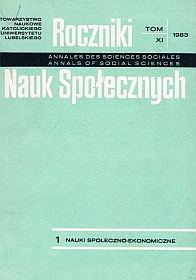The Activity and Social Thought of the Rev. Ignacy Kłopotowski (b. 1866 d. 1931)
Abstract
The Rev. Ignacy Kłopotowski was born in 1866 in the village of Korzeniówka upon the Bug River; he died in Warsaw in 1931. He was consecrated diocesan chaplain in Lublin by Bishop Franciszek Jaczewski in 1891. Until the year 1908 the Rev. I. Kłopotowski worked as a chaplain in Lublin where he established a number of charitable institutions (like e.g. St. Anthony’s Alms-House, Old-People’s Shelter, an orphanage for boys and girls) as well as an cooperative economic institution called Lublin Earning Home.
Between the years 1905 and 1907 he established a publishing press syndicate which included the „Polak—Katolik” daily, the „Posiew” weekly and the „Dobra Służąca” monthly (later the „Pracownica Polska”) and the publishing house, printing office and a bookshop. Apart from that he published many religious leaflets and booklets (also touching upon the social subject) which appeared in large printing runs and were addressed to the lower classes of Polish society.
Further development of the „syndicate” took place after the Rev. I. Kłopo- towski’s moving to Warsaw in 1908. In Warsaw he founded new magazines (the „Kółko Różańcowe”, „Anioł Stróż”, „Przegląd Katolicki”, „Głos Kapłański”). Since 1920 he worked as the parish priest of the Our Lady of Loretto parish in Warsaw and as a Praga District dean. In that year he established the congregation of Our Lady of Loretto sisters whose duties focused on charitable work and the apostolate of the Catholic book and press. In 1926 the Rev. I. Kłopotowski made over his publishing centre to the archdiocese in Warsaw. Later he himself founded a Lorettan Printing Office at Tamka Street in Warsaw which he moved to the district of Praga at the end of his life.
Until the end of his life the Rev. I. Kłopotowski was fully engaged in charitable, publicistic and journalistic work as well as his chaplain duties. He published about 130 items.
He was also strongly occupied with the social, political and economic problems of his time. The most topical issues of his epoch he popularized and interpreted according to the Church social teaching. He continued the 19th-century model of the press which, however, was becoming less popular in independent Poland. He was also a great propagator of the cult of Mother of God of the Rosary.
Copyright (c) 1983 Roczniki Nauk Społecznych

This work is licensed under a Creative Commons Attribution-NonCommercial-NoDerivatives 4.0 International License.


